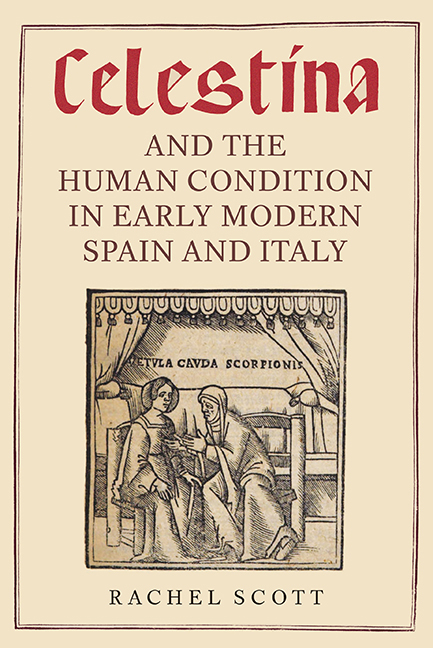Book contents
- Frontmatter
- Dedication
- Contents
- List of Illustrations
- Acknowledgements
- Note on Editions, Transcriptions, and Translations
- Introduction
- 1 Debating the Human Condition: Celestina's Interlocutors
- 2 Self-knowledge and Solitude: Diálogo de la dignidad del hombre
- 3 Fashioning Self and Society: Il Cortegiano
- 4 The Myth of Freedom: La vita delle puttane
- 5 Corrupting Women, Corrupting Words: Coloquio de las damas
- Afterword
- Bibliography
- Index
- Frontmatter
- Dedication
- Contents
- List of Illustrations
- Acknowledgements
- Note on Editions, Transcriptions, and Translations
- Introduction
- 1 Debating the Human Condition: Celestina's Interlocutors
- 2 Self-knowledge and Solitude: Diálogo de la dignidad del hombre
- 3 Fashioning Self and Society: Il Cortegiano
- 4 The Myth of Freedom: La vita delle puttane
- 5 Corrupting Women, Corrupting Words: Coloquio de las damas
- Afterword
- Bibliography
- Index
Summary
Celestina's prologues reveal an author who was profoundly aware of the comparative, interconnected, and dialogic nature of textual creation. Rojas situates the Comedia within an initial textual dialogue between an author and his ‘friend’, a perspective that later broadens with the Tragicomedia to include a wider audience of readers, editors, and printers, who apply their own ‘punturas’ to his creation, each interacting with and understanding it differently. It is as much a work about interpretation and the creation of meaning as it is about a love affair between two youths. Rojas may call attention to the dangerous effects of love in his letter to a friend, but by the time he had returned to and reworked the sixteen acts of the Comedia into the Tragicomedia, the work had acquired a decidedly more nuanced and ambiguous character, seen most vividly in Pleberio's lament and Melibea's death. The process of re-writing that Celestina underwent at Rojas's hands was only the first in a series of many. The many translations, adaptations and continuations it spawned testify to an ongoing dialogue across languages and geo-political and chronological boundaries that mirrors the work's own creation. Celestina exists in an ongoing conversation with readers and commentators who in turn became translators and adaptors, printers and editors. As with Rojas's own experience, each new re-reading, each new iteration, brings different nuances to the fore.
A broader perspective on Celestina's reception opens up new ways of understanding Rojas's work and its relationship to contemporary debates. This study has posited that one of the reasons for its success is its evident interest in the nature and condition of mankind. ‘Libro divino, si encubriera más lo humano’: Celestina has ever been represented as a book on the edge of the two poles of human existence, excellent yet fallen. Within its pages is a depiction of the worst of human behaviour – greed, lechery, deceit, theft, adultery, blasphemy, suicide, despair. Equally, however, elements in the work are suggestive of more positive views of man's potential: the focus on the need for self-knowledge, the striving for self-determination and agency, the acknowleged power of language and its importance in the fashioning of selfhood.
- Type
- Chapter
- Information
- Publisher: Boydell & BrewerPrint publication year: 2017



